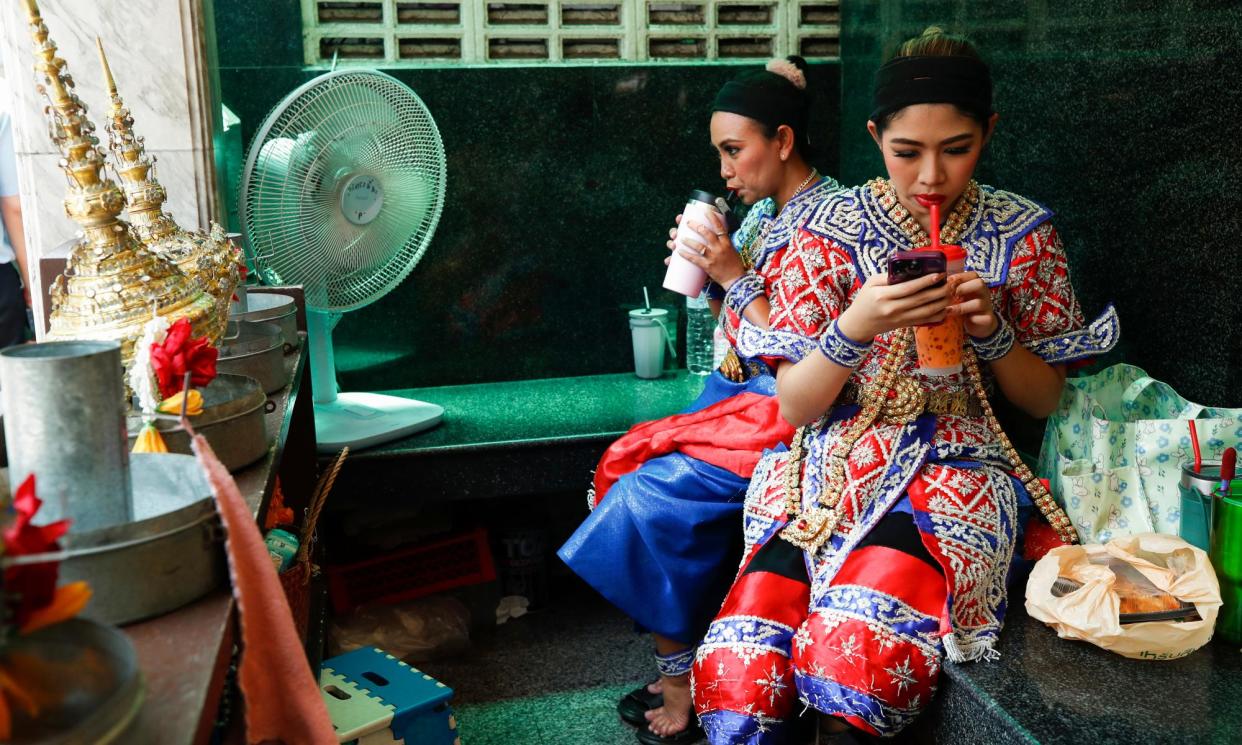‘Inside an oven’: sweltering heat ravages crops and takes lives in south-east Asia

Extreme heat has gripped much of south and south-east Asia over recent weeks, killing dozens of people, forcing millions of students to miss school and destroying crops.
Both the Philippines and Bangladesh shut schools due to the unbearable heat last month, while governments across the region have issued health warnings. In Thailand, at least 30 people have died from heatstroke since the start of the year.
The extreme weather has seen durian fruit burst on trees in Thailand, destroyed rice crops and caused eggs to shrink, according to local media. The heat has even been cited as a factor that led to an ammunition blast in Cambodia that killed 20 soldiers at an army base last weekend.
Records have been broken across the region. Bangladesh experienced its hottest April ever recorded, with daily maximum temperatures between 2C and 8C hotter than the 33.2C average daily high for the month. In Myanmar, 48.2C was reached in the town of Chauk, in central Magway region – the hottest April temperature since records began.
In Vietnam, 102 weather stations reported record highs in April. Northern and central areas of the country experienced temperatures up to 4C higher than the same period last year, while seven stations recorded temperatures above 43C on Tuesday last week. Kolkata, in India, also reached 43C, the city’s hottest April day since 1954.
Dr Roxy Mathew Koll, a climate scientist at the Indian Institute of Tropical Meteorology, said: “The frequency, intensity, duration and the area covered by these heatwaves are increasing over time. We are on a rollercoaster ride in terms of temperature, which is not going to come down any time soon. It’s going to be worse, which means we need to be prepared.”
Koll added that there was a need for governments to adapt – by developing policies to decide, for example, when schools should be shut or how to protect workers.
KC Libre, 15, is a student at Manuel Roxas high school in Manila, but she is currently studying at home after the school suspended in-person classes last week. “This is the first time that our classes have been suspended because of the hot weather,” she said. “We have 47 students in our class. Even with electric fans, it’s still hot, and usually there are only two electric fans switched on because ceiling fans in some of the rooms are broken.
“I feel irritated and can’t focus when it’s hot. The rooms are on the fourth floor, and so especially when I go up and down [the stairs], it’s really difficult … I won’t have even started writing yet but I’m already sweating.
“Even in our home it’s so hot. We don’t have aircon because we are not well-off. I do my school work at night because it’s less hot. In the morning, it’s as if extreme heat is blowing into you.
“The air coming from the electric fans is so hot … The heat inside of the oven … that’s what it feels like.”
Sae Klomkamnerd, 63, a farmer in Phichit province in Thailand, was forced to sell his 5,200 ducks as the extreme heat stopped them from laying eggs. “During the day, we would draw more groundwater to fill our pond, so the ducks can go in the water to cool down,” he said.
“But it’s still too hot; after 9 or 10 in the morning, the water becomes hot and they don’t want to get in any more. They just go in the shade and hide under the trees.
“In normal weather, 80-90% of the young ducks will lay eggs, but right now, when it’s so hot, it’s down to 60% or even down to 50%. In the case of the older ducks, the number of eggs is even down to 30%.”
He said the eggs the ducks did manage to lay were smaller than usual, meaning each tray of eggs weighed less and therefore fetched a lower price when sold. “I could only get 75 baht [£1.60] for those trays; in a good year, we could sell them for 100-105 baht per tray. This year is really awful, it’s really hard.”
Lay Samrach, 44, a construction worker in Phnom Penh, Cambodia’s capital, said: “I have never experienced this kind of heat. Other years were hot but this year it’s even hotter. When it’s too hot I can’t breathe.”
“Last year, we only took one break in the afternoon, but now we have up to three breaks in the afternoon because of the heat. I have to leave all my equipment in the shade. If I don’t do so it will break down my materials. Last year, I could leave my shovel out, but this year I can’t leave it out because I can’t use it if it’s so hot.”
AFP contributed to this report


